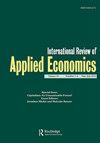Reviving financial markets – a critical assessment of the single resolution mechanism
IF 1.6
Q3 ECONOMICS
引用次数: 0
Abstract
ABSTRACT The creation of the Banking Union, set to be an integrated financial framework for the Eurozone, should be better understood as part of a larger process of governing through financial markets, where policy-makers resort to market-based instruments and policies for governance purposes, thus forming an alignment with the interests of financial elites. This paper assesses the Single Resolution Mechanism and highlights overlooked aspects of its design and decision-making process that are actively strengthening and further integrating market-based finance in the European banking system. The resolution framework and its underlying conditionalities imposed by the limited public intervention toolkit and the European State Aid regime are promoting banking capital concentration and the marketization of more traditional banking systems. Meanwhile, the discretionary decisions imposed by the European technocratic body reinforces the integration agenda, with often detrimental effects for the member states of the Southern Periphery. While the Banking Union has the overall goal of financial stability and increased convergence between member states, the outcomes of the Single Resolution Mechanism point to an increase in market-based finance and riskier business models at the expense of smaller and more traditional banking systems, fostering too-big-to-fail institutions and further deepening the already rooted intra-euro divergences.复兴金融市场——对单一处置机制的批判性评估
银行业联盟的建立将成为欧元区的综合金融框架,应该更好地理解为通过金融市场进行治理的更大过程的一部分,在这个过程中,政策制定者采用基于市场的工具和政策来实现治理目的,从而与金融精英的利益形成一致。本文评估了单一决议机制,并强调了其设计和决策过程中被忽视的方面,这些方面正在积极加强和进一步整合欧洲银行体系中的市场金融。有限的公共干预工具和欧洲国家援助制度所强加的决议框架及其基本条件正在促进银行资本集中和更传统的银行体系的市场化。与此同时,欧洲技术官僚机构强加的自由裁量决定强化了一体化议程,往往对南部外围成员国产生不利影响。尽管银行业联盟的总体目标是实现金融稳定,并加强成员国之间的趋同,但单一处置机制的结果表明,以较小和更传统的银行体系为代价,市场金融和风险更高的商业模式将会增加,催生“大而不能倒”的机构,并进一步加深本已根深蒂固的欧元区内部分歧。
本文章由计算机程序翻译,如有差异,请以英文原文为准。
求助全文
约1分钟内获得全文
求助全文
来源期刊

International Review of Applied Economics
ECONOMICS-
CiteScore
4.30
自引率
4.50%
发文量
37
期刊介绍:
International Review of Applied Economics is devoted to the practical applications of economic ideas. Applied economics is widely interpreted to embrace empirical work and the application of economics to the evaluation and development of economic policies. The interaction between empirical work and economic policy is an important feature of the journal. The Journal is peer reviewed and international in scope. Articles that draw lessons from the experience of one country for the benefit of others, or that seek to make cross-country comparisons are particularly welcomed. Contributions which discuss policy issues from theoretical positions neglected in other journals are also encouraged.
 求助内容:
求助内容: 应助结果提醒方式:
应助结果提醒方式:


